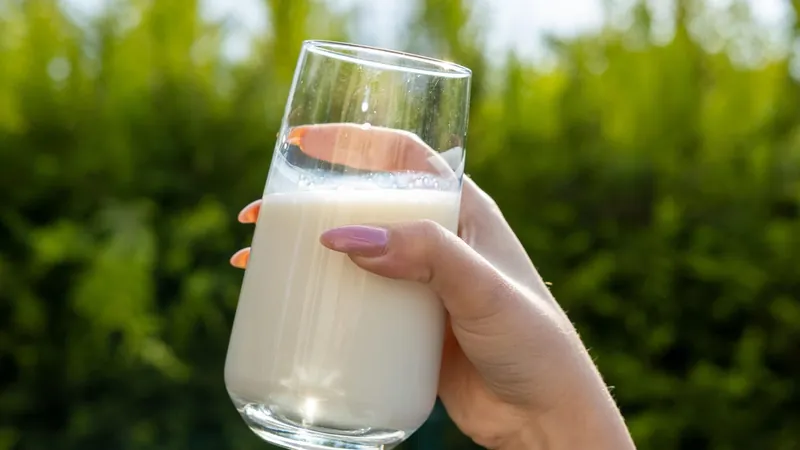
California Confirms Raw Milk Recall Due to Bird Flu: What You Need to Know!
2024-11-25
Author: Arjun
Introduction
In a concerning development for health-conscious consumers, one lot of raw milk sold in California has been voluntarily recalled after testing revealed the presence of the bird flu virus. This alert was issued by the California Department of Public Health on Sunday, as the state's officials address growing public concerns over food safety amidst an ongoing outbreak.
Details of the Recall
The specific batch of cream-top whole raw milk came from Raw Farm, located in Fresno County, and is marked with lot code 20241109 and a 'best by' date of November 27, 2024. Authorities strongly advise against consuming this milk and recommend returning it to the point of purchase immediately.
Current Health Status
Fortunately, no illnesses linked to this specific raw milk batch have been reported thus far. It’s essential to note that pasteurized milk, which constitutes the bulk of milk products available in stores, remains safe for consumption. However, health officials have heightened warnings regarding raw milk due to the current bird flu outbreak, which has sporadically affected humans in the U.S., particularly those who have had close contact with infected birds. Alarmingly, this includes cases with unknown origins, such as one involving a child from California, according to the CDC.
Overview of Pasteurization and Health Risks
This incident isn’t an isolated one; earlier this year, bird flu virus fragments were detected in over 20% of pasteurized milk samples analyzed across the U.S. Nonetheless, further genetic analysis confirmed that these samples didn't contain viable or infectious virus strains—thanks to the efficiency of the pasteurization process, which aims to eliminate harmful pathogens and viruses. Pasteurization, a technique developed by Louis Pasteur in the 1860s, is still a benchmark for ensuring dairy safety, as it effectively inactivates many viruses that threaten public health.
The Appeal of Raw Milk and Associated Risks
Despite the risks associated with raw milk, it has gained popularity among those who believe in its purported health benefits, prioritizing it for perceived natural qualities. However, this trend raises multiple health concerns. Experts continually warn that raw milk can harbor harmful bacteria like E. coli, Listeria, and Salmonella, which pose serious risks to vulnerable populations such as children, the elderly, and immunocompromised individuals.
Expert Opinions on the Matter
Dr. Amesh Adalja from the Johns Hopkins Center for Health Security emphasizes that while finding bird flu virus fragments in milk does not suddenly elevate public health risks, the safety of unpasteurized options remains dubious. “Influenza viruses are not typically transmitted through ingestion,” he noted, but the possible existence of the virus in raw milk serves as a reminder of the potential dangers.
Myths and Realities of Raw Milk
Fantasy claims surrounding raw milk often center on its supposed health benefits, such as improved digestion and higher nutritional value. However, mounting evidence from public health organizations, including the CDC and FDA, dispels many of these claims. Their research indicates that pasteurization does not significantly impact the nutritional quality of milk. If you're looking for health foods that genuinely support gut health, consider alternatives like fermented products—kimchi, sourdough, or buttermilk.
Conclusion
The public’s shift toward raw milk consumption also reflects a growing trend toward natural and holistic eating, though experts caution against disregarding well-established food safety processes like pasteurization. Given the current bird flu concerns, consumers are urged to remain informed about the risks associated with raw milk and prioritize health above trend-driven choices.
Final Thoughts
Stay informed about food safety and understand the risks vs. benefits involved in your dietary preferences. Your health is paramount—make sure your choices reflect that!




 Brasil (PT)
Brasil (PT)
 Canada (EN)
Canada (EN)
 Chile (ES)
Chile (ES)
 España (ES)
España (ES)
 France (FR)
France (FR)
 Hong Kong (EN)
Hong Kong (EN)
 Italia (IT)
Italia (IT)
 日本 (JA)
日本 (JA)
 Magyarország (HU)
Magyarország (HU)
 Norge (NO)
Norge (NO)
 Polska (PL)
Polska (PL)
 Schweiz (DE)
Schweiz (DE)
 Singapore (EN)
Singapore (EN)
 Sverige (SV)
Sverige (SV)
 Suomi (FI)
Suomi (FI)
 Türkiye (TR)
Türkiye (TR)